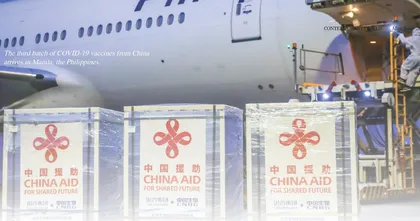China’s Solution to Global Governance Crisis
作者: [Argentina] Néstor Restivo

In today’s highly globalized world, countries and regions are ever more closely intertwined with more complex relations. As COVID-19 pandemic changes international order in a profound way, the challenges facing global governance system have intensified. There is an urgent call for change. In this context, China offers a new solution to improving global governance by proposing the vision of building a community with a shared future for mankind.
COVID-19 pandemic reflects limitations of global governance
At present, numerous international organizations and cooperation mechanisms are coordinating global endeavors in rules making, trade, finance, nuclear energy, migrant management and other hundreds of areas. They have played an indispensable role in the coordinated development of all countries in the world. There is, however, no doubt a long way to go between making rules and actually implementing them.
The UN is often limited in coordinating global issues despite itself being the largest international organization. To make up for that, the G20, an organization with far fewer members than the UN, was created. Since its inception, it has been committed to reforming the IMF and others, and addressing the ills of international financial system so as to improve the well-being of people in developing countries. With that said, it is overstretched in many circumstances. To this day, the IMF reform proceeds at a slow pace, and tax havens are still emerging. The current global governance is obviously far from being effective.
It is true that international organizations such as the UN, the WTO and the Intergovernmental Panel on Climate Change, as well as laudable agreements such as the Treaty on the Non-Proliferation of Nuclear Weapons, have played a positive role in promoting global development. However, as the existing global rules system took shape after the second world war and still stays within its original framework despite experiencing several reforms, it can no longer adapt to the adjustments and changes of the international landscape.
The public health crisis of COVID-19 outbreak has prompted further reflection. It has laid bare the flaws in global governance system, with U.S. and other western countries failing to coordinate and cooperate with each other without taking political position, letting alone organizing global efforts to respond to the pandemic. It has shown how the world is divided, and how the West often act with political and geopolitical intent, recriminations, prejudice, arrogance and racism. The ultimate victims of such are hundreds of millions of ordinary people. If the world had responded to the outbreak with concerted efforts led by a widely recognized body, say WHO, many lives would not have been lost.
However, the U.S.-led western countries blame China for the origin of the virus and manipulate public opinion to smear China. The U.S. is to blame for politicizing the pandemic.
Fortunately, their lies and false claims fall apart in the face of facts. There are more and more voices in international community in support of China. In July 2021, the Argentine Senate Center for the Observation of International Policy released report Vaccine Diplomacy, pointing out that COVID-19 has led to a surge of vaccine nationalism in the U.S., Europe and some other western developed countries who have rejected once and again the opportunities for consultation, joint planning and cooperation driven by their mere concern of self interests. Vaccine nationalism has pitted these countries against each other and against the WHO. In stark contrast to them, Chinese government has opened a dedicated air route connecting China and Argentina for transporting vital anti-pandemic supplies. This has ensured Argentina’s access to basic supplies, provided support for its response to COVID-19, and fended off the risks of vaccine nationalism.
COVID-19 has on the one hand shown the current global governance limitations, and on the other, presented mankind new opportunity to reflect and to explore how countries can transcend ideology and collectively respond to the unending global crises.
China’s role in global governance
There are some countries that always take a back seat in global decision-making system despite their important roles in global governance system. In order to have their say in global affairs they have begun to take steps. Since entering the 21st century, the world has seen profound power shift. East Asia, especially China, has once again become an important growth engine of the world economy. In South Asia, India is rising gradually. In Eurasia, Russia develops into an important local fulcrum. In Latin America, powers represented by Brazil are emerging. In Africa, South Africa has made positive progress in its political transformation. Although these regions still face their share of development difficulties, they are gradually developing into new forces without overturning the established world order.
China today is a world leader in many fields including economy, finance, trade, science and technology. China is committed to opening up, actively engaging in various international organizations and promoting multilateral cooperation. At the same time, China is working with other emerging countries to reform global governance system and build new global governance mechanism, so as to make it more open, inclusive, just and equitable.